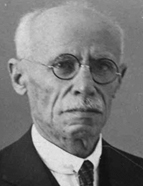

João Lúcio de Azevedo came from an Azorean family on the part of his father, António Lúcio de Azevedo. His mother, Teresa Amélia de Azevedo, belonged to a family from Mafra, where her parents had settled in the parish of Santo André. After his mother ’ s death, he was brought up by his maternal grandmother and attended the local public school, but took his exams in Porto.
Enrolled at the Colégio do Sérvulo in Junqueira, Lisbon, from 1868 , he took several exams as an external student at the National Secondary School in Lisbon, then enrolled at the Commercial and Industrial Institute in Lisbon, where he obtained his diploma in 1872. His classmates were Guilherme de Oliveira Martins, brother of Joaquim Pedro de Oliveira Martins, and Henrique Lopes de Mendonça, whose friendship he retained throughout his life.
His education continued as he came into contact with other cultures, languages and civilisations. His first experience was provided by Brazil , where he travelled to in 1873 and from where he left only in 1900 to settle in Portugal, but not before he had visited North America (he was in New York in 1896). After returning to Europe, he also visited France (spending some time in Paris), Switzerland , and Germany. His knowledge of several languages is closely linked to his travels. His ability in this field is demonstrated by his reviews of original works in French, English , and German and the fact that he studied Dutch in order to be able to work on the history of the Jews and New Christians, especially Baruch de Spinoza. He translated the biography of Spinoza by Johannes Colerus (only published in 1934).
Following his deep-rooted cultural choice, the opportunity to develop his education in Brazil, provided by his first job at the Tavares Cardoso bookshop in Pará, must have been particularly significant, followed by a job in a rubber company and a river shipping company. In the meantime, he married his cousin, Ana da Conceição Botelho, with whom he had three children. So that he could take over the management of a river shipping company in Belém, in accordance with the requirements of the legislation in force, he became a naturalised Brazilian citizen. He was admitted to the Instituto Histórico e Geográfico Brasileiro [Brazilian Historical and Geographical Institute] as a ‘national member’ (1895).
This work is financed by national funds through FCT - Foundation for Science and Technology, I.P, in the scope of the projects UIDB/04311/2020 and UIDP/04311/2020.
